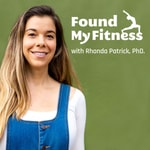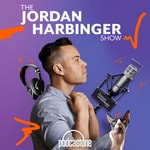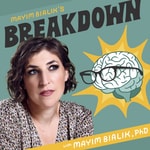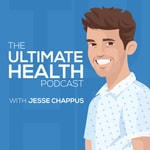FoundMyFitness – Details, episodes & analysis
Podcast details
Technical and general information from the podcast's RSS feed.

FoundMyFitness
Rhonda Patrick, Ph.D.
Frequency: 1 episode/39d. Total Eps: 104

Recent rankings
Latest chart positions across Apple Podcasts and Spotify rankings.
Apple Podcasts
🇨🇦 Canada - medicine
01/08/2025#1🇨🇦 Canada - healthAndFitness
01/08/2025#5🇨🇦 Canada - General
01/08/2025#66🇬🇧 Great Britain - medicine
01/08/2025#1🇬🇧 Great Britain - healthAndFitness
01/08/2025#9🇩🇪 Germany - medicine
01/08/2025#18🇩🇪 Germany - healthAndFitness
01/08/2025#93🇺🇸 USA - medicine
01/08/2025#2🇺🇸 USA - healthAndFitness
01/08/2025#12🇫🇷 France - medicine
01/08/2025#11
Spotify
🇺🇸 USA - health & fitness
01/08/2025#28→🇺🇸 USA - health & fitness
31/07/2025#28↗🇺🇸 USA - health & fitness
30/07/2025#29→🇺🇸 USA - health & fitness
29/07/2025#29→🇺🇸 USA - health & fitness
28/07/2025#29↘🇺🇸 USA - health & fitness
27/07/2025#28↘🇺🇸 USA - health & fitness
26/07/2025#27↘🇺🇸 USA - health & fitness
25/07/2025#24↗🇺🇸 USA - health & fitness
24/07/2025#26→🇺🇸 USA - health & fitness
23/07/2025#26→
Shared links between episodes and podcasts
Links found in episode descriptions and other podcasts that share them.
See allRSS feed quality and score
Technical evaluation of the podcast's RSS feed quality and structure.
See allScore global : 53%
Publication history
Monthly episode publishing history over the past years.
#095 What Microplastics Are Doing to Your Brain, Body, and Reproductive Systems
jeudi 19 septembre 2024 • Duration 01:14:31
Discover my premium podcast, The Aliquot
Every week, the average person ingests the equivalent weight of a credit card in plastic. While certain preventive measures can significantly reduce your intake of these harmful substances, it’s crucial to acknowledge a more daunting concern: the bioaccumulation of microplastics in the brain, potentially at ten times the rate of other organs. Microplastics and their associated chemicals are alarmingly ubiquitous — they permeate breast milk, sperm, the hippocampus, the prefrontal cortex, the air we breathe, medications, the water supply, and our bloodstream, accumulating in most major organ systems. During this episode, we’ll explore the unsettling realities of microplastics and their associated chemicals, diving into how they infiltrate nearly every facet of our environment and body, and discuss actionable strategies to reduce exposure.
Timestamps:
- (00:00) The extent of the problem
- (02:12) Top sources of exposure
- (04:00) Contamination of our water
- (05:04) BPA, phthalates, & PFAS (forever chemicals)
- (07:06) How heating plastic affects BPA exposure
- (09:21) Our unfortunate habit of eating credit cards
- (11:33) Microplastics in major organs
- (14:05) Crossing the blood-brain barrier
- (15:01) How microplastics affect a developing fetus
- (15:55) The bloodstream is a highway for microplastics
- (18:12) Endocrine and hormonal effects
- (23:09) Consequences in pregnant women
- (25:35) How phthalates affect reproductive health
- (26:36) BPA's involvement in autism spectrum disorder
- (29:58) Side effects of prenatal BPA exposure
- (32:18) The brain may be a super-accumulator of plastic
- (34:50) Human brain microplastic levels are rising
- (36:06) Lost fertility in women
- (38:07) Changes in sperm quality
- (39:23) Microplastics in sperm
- (40:59) Why the heart suffers
- (42:51) Microplastics in arterial plaque
- (43:56) How BPA affects blood pressure
- (45:58) Risk of cancer
- (50:31) Topo Chico sparkling water
- (53:02) Reverse osmosis filtration
- (54:56) Food-based strategies for limiting microplastics
- (56:32) The "myth" of BPA-free plastics
- (58:14) Is salt a source of microplastics?
- (59:18) HEPA filters
- (1:00:52) Choose your clothing wisely
- (1:01:47) How to prevent release of microplastics (from laundry)
- (1:02:32) Receipts and thermal paper
- (1:04:17) Microplastic excretion and breakdown
- (1:06:28) Sulforaphane for detoxifying
- (1:08:38) Can dietary fiber increase microplastic excretion?
- (1:10:15) Are plastic chemicals excreted through sweat?
- (1:11:21) Do excretion strategies work for "forever chemicals"?
#094 Dr. Layne Norton on Building Muscle – Insights on Diet, Training, and Supplements
jeudi 22 août 2024 • Duration 03:34:35
Discover my premium podcast, The Aliquot
Dr. Layne Norton is a Ph.D. in Nutritional Sciences, a professional bodybuilder, and a champion powerlifter. We discuss why most people aren’t training too hard, when to go to failure, whether seed oils are “the” central cause of chronic disease, why having a slow metabolism isn’t a credible reason for being overweight (for most), and the sustaining power of good habits. We also get into controversies around the carnivore diet, diet sodas, artificial sweeteners, intermittent fasting, and much more.
Timestamps:
- (00:00) Introduction
- (04:48) Layne's coaching philosophy
- (14:39) Why to start tracking calories (for at least 3 days)
- (17:41) Why people lie to themselves about food intake
- (23:06) The profound benefits of small exercise doses
- (26:53) Why you should treat exercise like brushing your teeth
- (30:11) Benefits of resistance training for older individuals
- (33:51) Should you train to failure?
- (47:07) Why hard training & consistency trump exercise selection
- (56:46) Is lifting heavy necessary for building muscle?
- (57:54) Barbell vs. hack squats for preventing falls
- (1:00:10) Can lifting weights decrease low-back pain?
- (1:01:43) Injury prevention when resistance training
- (1:11:16) How exposure therapy can help you with injuries
- (1:15:04) Why pain doesn't always indicate tissue injury
- (1:18:17) Should you resistance train after a poor night of sleep?
- (1:21:57) Why menopause can cause weight gain
- (1:29:36) Why it's never too late to start lifting weights
- (1:32:05) Resistance training tips for older individuals with joint pain
- (1:36:18) Why total protein intake matters more than distribution
- (1:44:19) Layne's daily protein distribution
- (1:46:44) The shortcomings of nutrition studies
- (1:54:06) Is consuming more than 1.6 g/kg of protein beneficial?
- (1:55:33) Should you eat more protein in a calorie deficit?
- (1:56:43) Protein intake for endurance athletes
- (1:58:07) How much protein does Layne eat?
- (1:59:11) Are seed oils a predominant cause of chronic disease?
- (2:08:45) Does the carnivore diet increase heart disease risk?
- (2:14:16) Are heated seed oils more inflammatory?
- (2:20:33) Is there a "big food" industry conspiracy?
- (2:26:17) Are sugar-sweetened beverages uniquely deleterious?
- (2:30:17) Can diet soda help you lose weight?
- (2:34:20) Microbiome & cancer risks of diet soda
- (2:42:02) Is drinking 1 Diet Coke per day unhealthy?
- (2:44:24) Why Layne rarely takes a strong position on early science
- (2:49:04) Carnivore diet
- (3:01:52) Time-restricted eating
- (3:12:38) Layne's daily routine
- (3:16:55) Layne's diet and supplements
- (3:19:49) Creatine and hair loss
- (3:22:49) Rhodiola rosea & ashwagandha
- (3:25:54) Layne's tier 2 supplements
Show notes are available by clicking here
#085 Dr. Peter Attia on Mastering Longevity – Insights on Cancer Prevention, Heart Disease, and Aging
mercredi 27 décembre 2023 • Duration 03:59:02
Download the 9-Page "Cognitive Enhancement Blueprint"
Discover my premium podcast The Aliquot
Show notes are available by clicking here
Peter Attia, MD is a highly respected expert in preventive medicine, focused on the crucial subject of longevity and cardiovascular health. He's also the author of the NY Times best selling book Outlive - which I highly recommend if you have not read it already. Peter's philosophy transcends the conventional goal of merely extending lifespan; it's about enriching the quality of every year, ensuring that each stage of life is lived with optimal health and vitality.
In this episode, we discuss:
- (00:00) Introduction
- (07:36) Defining cardiovascular disease
- (09:43) Coronary plaque and fatality risk
- (13:34) How ApoB predicts heart disease
- (21:34) Factors elevating ApoB
- (27:23) Does high ApoB cause cardiovascular disease
- (37:01) ApoB thresholds for ASCVD prevention
- (40:27) Dietary factors raising ApoB
- (49:33) Genetics of ApoB and LDL
- (53:24) Does low LDL increase cancer?
- (56:19) Cholesterol-lowering drugs
- (59:59) Statins, uses, and side effects
- (1:03:12) Are statins toxic to mitochondria?
- (1:09:56) Ubiquinol for statin-induced muscle soreness
- (1:11:09) How to train in zone 2
- (1:17:09) Statins and neurodegenerative disease risk
- (1:21:54) Cholesterol synthesis in the brain (desmosterol role)
- (1:25:58) Statin alternatives
- (1:36:49) Berberine for CVD Risk Reduction?
- (1:39:36) Muscle as a glucose sink
- (1:51:38) Hemoglobin A1C Levels and Mortality Data
- (1:55:35) 80/20 Zone 2/VO2 Max Training Protocol
- (2:02:12) Insights from VO2 max testing data
- (2:12:17) How obesity increases cancer risk
- (2:15:03) Cancer screening
- (2:40:32) Menopause – hormonal shifts and health effects
- (2:45:13) Hormone replacement therapy (HRT)
- (2:58:57) Perimenopause diagnosis with hormone levels
- (3:02:04) HRT's impact on dementia, cancer, and heart disease risk
- (3:07:42) Vitamin D
- (3:16:24) Testosterone replacement for women's sexual function
- (3:18:47) HRT safety 10 years post-menopause
- (3:23:05) Testosterone & TRT
- (3:32:33) Blood pressure
- (3:45:30) Peter's longevity optimization routines
Become a FoundMyFitness premium member to get access to exclusive episodes, emails, live Q+A’s with Rhonda and more: https://www.foundmyfitness.com/premium
#084 The Longevity & Brain Benefits of Vigorous Exercise | Dr. Rhonda Patrick
mardi 5 décembre 2023 • Duration 01:02:54
Download the 9-Page "Cognitive Enhancement Blueprint" companion guide at bdnfprotocols.com.
This episode challenges common perceptions about exercise, delving deep into the benefits of vigorous exercise for not just physical health but also brain function, aging, and even cancer prevention. It tackles fundamental questions, like what genetic and metabolic adaptations occur with vigorous exercise and how it can contribute to combating heart's age-related changes. We also unpack how these rigorous exercises affect glucose transport, mitochondrial health, and brain health at an intricate level. Lastly, it introduces practical applications like the Norwegian 4x4 interval training protocol, the benefits of "exercise snacks," and how to incorporate vigorous-intensity exercise into everyday life.
In this episode, I discuss:
(00:00) Introduction
(04:34) What differentiates "vigorous" from "zone 2" training
(08:34) Ties between VO2 max & life expectancy
(11:55) Why zone 2 training doesn't guarantee VO2 max improvements
(14:17) How to balance zone 2 training & vigorous-intensity workouts
(16:17) Why the Norwegian 4x4 protocol may improve your VO2 max
(19:35) Evidence-based methods to estimate VO2 max outside a lab.
(22:33) What it takes to reverse 20 years of heart aging: a two-year protocol
(28:24) HIIT and type 2 diabetes – how vigorous exercise can reduce risk.
(29:38) The mitochondria argument: HIIT vs. Zone 2 – which intensity is better?
(32:09) Rethinking the 80-20 rule for everyday exercisers (less zone 2, more effort)
(35:18) The role of high-intensity workouts in enhancing mitophagy
(38:03) Why lactate accumulation from higher training intensity benefits the brain
(40:28) Why the "glucose sparing" effect of lactate benefits brain injury and aging
(43:26) The unique BDNF benefits of high-intensity exercise: the lactate advantage
(44:42) The angiogenic effects of VEGF on the blood-brain barrier (in response to lactate)
(46:58) The greater the exercise intensity, the greater the myokine release
(49:48) How physical activity affects death risk in breast & colorectal cancer survivors
(50:56) How vigorous aerobic exercise kills circulating tumor cells
(52:36) Why exercise reduces depression and neurotoxicity (kynurenine mechanism)
(54:13) The surprising power of "exercise snacks" against mortality
(1:01:36) Download "The Cognitive Enhancement Blueprint" at bdnfprotocols.com
Show notes are available by clicking here
Get the latest distilled information straight to your inbox several times per month: https://www.foundmyfitness.com/newsletter
Become a FoundMyFitness premium member to get access to exclusive episodes, emails, live Q+A’s with Rhonda and more: https://www.foundmyfitness.com/premium
Learn more about our premium podcast, The Aliquot: https://www.foundmyfitness.com/aliquot
#083 How Vitamin D, Omega-3s, & Exercise May Increase Longevity | Dr. Rhonda Patrick
vendredi 10 novembre 2023 • Duration 01:00:34
This episode features Rhonda Patrick, Ph.D., and was originally recorded for the Institute for Functional Medicine's podcast, 'Pathways to Wellbeing.' This episode outlines a series of fundamental tactics you can start applying immediately to enhance cellular health, protect the nervous system, elevate mood, reduce inflammation, promote muscle and bone function, and help prevent chronic disease.
In this episode, I discuss:
- (00:00) Introduction
- (01:04) Vitamin D deficiency — risks, why it's so common, & correcting with supplementation
- (08:20) Magnesium's critical role in DNA repair & synthesis
- (11:49) The best dietary sources of magnesium
- (13:05) Magnesium supplements: Glycinate, malate, dioxide, & citrate
- (14:14) Exercise staves off age-related disease
- (14:52) How genetic SNPs can affect vitamin D deficiency risk
- (20:09) Low omega-3 intake from seafood is a top-6 preventable cause of death
- (22:22) Why ALA's conversion into EPA & DHA is inefficient
- (25:15) Omega-3 index: Optimal levels & ties to increased life expectancy
- (28:27) How omega-3s reduce inflammation, a key driver of aging
- (30:39) Omega-3s protect against muscle disuse atrophy
- (31:38) Why avoiding fish during pregnancy is a huge mistake
- (34:02) Omega-3s are a low-hanging fruit for improving cardiovascular & brain health
- (35:46) What to look for when choosing an omega-3 supplement
- (39:57) Hormesis: Why intermittent stressors are beneficial
- (46:14) How to choose an exercise regimen
- (47:09) “Exercise snacks” reduce all-cause & cancer-related mortality
- (49:24) Brain benefits of lactate from vigorous exercise
- (52:23) How blood flow generated from aerobic exercise kills circulating tumor cells
- (54:30) Rhonda's workout regimen
- (55:38) HIIT ameliorates adverse effects of sleep deprivation
- (58:32) Exercise is the best longevity "drug"
Show notes are available by clicking here
Get the latest distilled information straight to your inbox several times per month: https://www.foundmyfitness.com/newsletter
Become a FoundMyFitness premium member to get access to exclusive episodes, emails, live Q+A’s with Rhonda and more: https://www.foundmyfitness.com/premium
Learn more about the premium podcast The Aliquot: https://www.foundmyfitness.com/aliquot
#082 The Science of Vigorous Exercise — Should We Train Hard or Train Long? | Martin Gibala, Ph.D.
mardi 19 septembre 2023 • Duration 02:51:34
Dr. Martin Gibala is a muscle physiologist, professor, and kinesiology department chair at McMaster University in Hamilton, Ontario, Canada. He is best known for pioneering research on the health benefits of high-intensity interval training (HIIT) and his profound understanding of HIIT's physiological mechanisms. He is a co-author of the book "The One-Minute Workout."
In this episode, we discuss:
- (00:00) Introduction
- (11:00) What is high-intensity training?
- (11:53) Zone 2 vs. HIIT for VO2 max — which is better?
- (13:22) The vital role of vigorous exercise
- (14:40) Why VO2 max matters for longevity
- (17:45) Why athletes vs. exercisers benefit from different intensity distributions
- (22:09) Measuring maximum heart rate and VO2 max
- (30:31) How the heart adapts to HIIT to increase VO2 max
- (35:47) Why vigorous exercise accelerates mitochondrial adaptation
- (40:06) Enhancing fat oxidation and mitochondrial growth with vigorous exercise
- (44:22) How intensive exercise boosts fat breakdown
- (45:56) Is high-intensity exercise better for autophagy than fasting?
- (55:15) Exercise snacks
- (57:55) Why 'choosing the stairs' reduces early death (VILPA study)
- (1:00:39) Protocol for VO2 max
- (1:05:50) The effect of HIIT on muscle fiber types
- (1:10:18) How aging effects muscle fibers
- (1:14:09) Does high-intensity training produce an "afterburn effect?"
- (1:16:13) Why vigorous workouts are better for BDNF and cognition
- (1:23:15) Anti-metastatic cancer effects
- (1:50:23) Wingate training vs. reHIIT — a comparison of protocols
- (1:55:38) Perceived exertion vs. HRmax
- (1:59:23) Interval walking for people with type 2 diabetes
- (2:01:06) Contraindications of HIIT
- (2:05:06) Why preconditioning reduces risks from exercise
- (2:10:44) Can resistance training be a type of aerobic exercise?
- (2:16:24) Does cardio and strength training interfere with each other?
- (2:18:45) How many minutes per week of high-intensity training?
- (2:26:58) Are there sex differences and misconceptions in high-intensity training, for women?
- (2:27:42) Should post-menopausal women do H.I.I.T.?
- (2:27:47) Does intense exercise raise cortisol?
- (2:34:16) Bone density and osteoarthritis
- (2:36:40) Atrial fibrillation risk
- (2:39:20) Hypoxic training and blood flow restriction
- (2:40:45) Tips for training with joint issues
Show notes are available by clicking here
Join over 300,000 people and get the latest distilled information straight to your inbox several times per month: https://www.foundmyfitness.com/newsletter
Become a FoundMyFitness premium member to get access to exclusive episodes, emails, live Q+A’s with Rhonda and more: https://www.foundmyfitness.com/premium
Learn more about the premium podcast The Aliquot: https://www.foundmyfitness.com/aliquot
#081 The Anabolic Potential of Omega-3 Fatty Acids | Chris McGlory, PhD
lundi 3 juillet 2023 • Duration 01:36:34
Dr. Chris McGlory is an assistant professor at Queen's University in Kingston, Ontario, Canada. Known for his work in the field of muscle physiology and aging, Dr. McGlory's research focuses on elucidating the molecular mechanisms underlying muscle protein synthesis and degradation, with a particular emphasis on the roles that omega-3 fatty acids play in maintaining muscle health in older adults.
In this episode, we discuss:
- (00:00) Introduction
- (05:50) Start of interview
- (13:03) Why atrophy is worse for the old than the young
- (15:23) Can dietary protein prevent atrophy?
- (17:35) Why reduced movement can insidiously mimic short-term immobilization
- (22:51) The disability threshold — when atrophy may actually be deadly
- (24:58) Does high-dose omega-3 hold the key to fighting atrophy? (5g/day)
- (28:35) Does omega-3 help muscle respond more optimally to low protein?
- (41:37) Why omega-3 must be preloaded for 4 to 6 weeks
- (44:20) Why omega-3 trials have conflicting results
- (50:16) Does omega-3 enhance strength?
- (52:42) Sex differences in gaining mass and strength
- (54:46) Improvements in gait speed and balance (muscle performance / physical performance battery)
- (55:49) How to act on mixed evidence — and should we?
- (58:17) Why omega-3 may reduce frailty in old age
- (1:01:59) Why the anabolic mechanisms are counterintuitive (going beyond the canonical anti-inflammatory role of omega-3)
- (1:07:42) Do omega-3s boost tired, dysfunctional mitochondria?
- (1:15:16) Why we need an "omega-3 index" for muscle
- (1:18:52) Why the inflammation from cancer wastes muscle
- (1:20:38) Does omega-3 reduce atrophy from cancer cachexia?
Show notes are available by clicking here
Join over 300,000 people and get the latest distilled information straight to your inbox several times per month: https://www.foundmyfitness.com/newsletter
Become a FoundMyFitness premium member to get access to exclusive episodes, emails, live Q+A’s with Rhonda and more: https://www.foundmyfitness.com/premium
Learn more about the premium podcast The Aliquot: https://www.foundmyfitness.com/aliquot
#080 How Heat Therapy Improves Slow Wave Sleep
mardi 30 mai 2023 • Duration 15:26
Heat therapy, such as using a sauna or soaking in a hot bath, may significantly improve your slow wave sleep. My latest episode delves into the fascinating intersection between exercise and passive body heating and elucidates how high energy expenditure exercise and heat exposure share nuanced mechanisms in sleep regulation. Some key aspects explored include:
- The surprising role of the immune system in regulating sleep through somnogenic cytokines, immune signals like IL-1B and TNF-alpha, released in response to heat stress and exercise.
- The interconnected nature of thermoregulation and sleep, particularly in the brain, which highlights the importance of overlapping sleep regulation and heat loss processes. This involves warm-sensing preoptic area neurons in the preoptic area of the hypothalamus, a region known to play a crucial role in sleep regulation.
- The intricate, bidirectional relationship between growth hormone (GH) and slow-wave sleep (SWS). With the majority of daily GH secretion occurring during the initial phase of SWS, stimulants of SWS, such as heat exposure, can result in enhanced GH secretion, establishing a strong connection between GH and sleep regulation.
- The varying influence of heat on growth hormone, ranging from doubling after two 20-minute sauna sessions at 80°C, to increasing its circulation up to 16-fold after two one-hour sauna sessions at 80°C.
These findings highlight the potential for heat therapy and exercise with a high rate of energy expenditure to modulate slow wave sleep through the interconnected nature of thermoregulation, immunity, exercise, and hormones. By understanding and harnessing these links, individuals can potentially enhance their sleep quality and overall health and well-being.
In this episode, I discuss:
- (00:00) - Introduction
- (01:06) - Increasing pre-sleep tiredness
- (02:06) - Effects of exercise
- (04:09) - How the immune system regulates sleep
- (05:07) - What heat and exercise have in common
- (06:39) - Hormonal effects of heat
- (06:59) - Growth hormone
- (09:26) - Prolactin and sleep onset
- (10:39) - Effect of sexual activity
- (12:08) - Overlap in the brain (thermoregulation vs. sleep)
- (12:46) - Heat protocols and tactics
Show notes are available by clicking here
Join over 300,000 people and get the latest distilled information straight to your inbox several times per month: https://www.foundmyfitness.com/newsletter
Become a FoundMyFitness premium member to get access to exclusive episodes, emails, live Q+A’s with Rhonda and more: https://www.foundmyfitness.com/premium
Learn more about the premium podcast The Aliquot: https://www.foundmyfitness.com/aliquot
#079 Blood-Brain Barrier Dysfunction in Alzheimer’s Disease and Dementia | Axel Montagne, Ph.D.
mardi 28 février 2023 • Duration 01:48:46
Dr. Axel Montagne is a chancellor's fellow and group leader at the UK Dementia Research Institute at the University of Edinburgh Centre for Clinical Brain Sciences. His group aims to understand how, when, and where critical components of the blood-brain barrier become dysfunctional preceding dementia and in the earliest stages of age-related cognitive decline. With this knowledge, they hope to develop precise treatments targeting brain vasculature to protect brain function.
More importantly his work, and that of his colleagues, provide a critical lens through which to view the contributions of vascular dysfunction (or, conversely, vascular health – if we choose to preserve it) as a critical common thread in dementia and neurodegeneration.
In this episode, we discuss:
- (00:00) Introduction to Dr. Axel Montagne
- (11:44) What dementias have in common
- (12:42) The importance of preserving small blood vessels (in the brain)
- (13:38) Changes in the blood-brain barrier in aging that cause "leaking"
- (15:11) Predicting cognitive decline early with biomarkers – an opportunity for intervention?
- (16:32) Why targeting amyloid isn’t enough
- (18:54) The impact of the APOE4 genotype on brain vasculature
- (24:19) The cause of white matter damage in the brain
- (33:47) Why the loss of omega-3 transport affects pericytes
- (35:25) The role of exercise in prevention of blood-brain barrier dysfunction
- (35:45) Why high heart rates during exercise preserve brain function
- (36:49) The role of exercise in preserving vision health
- (40:17) Why leaky vessels damage myelin and the brain
- (45:31) Can you have more than one type of dementia?
- (47:54) Does the breakdown of the blood-brain barrier cause “type 3 diabetes"?
- (54:03) Why omega-3 may prevent detachment of pericytes
- (1:14:35) Why a hepatitis drug restored cognition in APOE4 mice
- (1:19:39) Why blood-brain barrier disruption results in the accumulation of amyloid-beta
- (1:25:14) Why lifetime hypertension increases dementia risk
- (1:37:13) Effects of obesity on blood-brain barrier leakage
Show notes are available by clicking here
Join over 300,000 people and get the latest distilled information straight to your inbox several times per month: https://www.foundmyfitness.com/newsletter
Become a FoundMyFitness premium member to get access to exclusive episodes, emails, live Q+A’s with Rhonda and more: https://www.foundmyfitness.com/premium
Learn more about the premium podcast The Aliquot: https://www.foundmyfitness.com/aliquot
#078 Resistance training for time efficiency, body composition, and maximum hypertrophy | Brad Schoenfeld, Ph.D.
mardi 6 décembre 2022 • Duration 02:04:36
Dr. Brad Schoenfeld is a professor at Lehman College in the Bronx, in New York City. His research primarily focuses on muscle adaptations to strength training, muscle hypertrophy. Publishing over 300 studies in the field of exercise and sports nutrition as a scientist, Brad began his career as a competitive bodybuilder and personal trainer.
In this episode, we discuss:
- (00:00) Introduction to Dr. Brad Schoenfeld
- (05:26) Why should we lift weights?
- (06:56) Why building bone matters
- (11:33) How to lift in old age
- (13:45) Why to lift while young (especially women)
- (16:21) Should children lift weights?
- (17:05) Does lifting stunt growth?
- (19:48) How to change body composition
- (27:22) Protein requirements
- (29:19) How to calculate protein needs
- (36:54) Protein per meal - what's the right amount?
- (38:18) Does time-restricted eating undermine hypertrophy?
- (43:19) Anabolic window: myths vs. reality
- (46:15) Total daily protein intake
- (54:49) Why aging affects muscle power (loss of type II fibers)
- (57:52) Power training vs. strength
- (59:20) Benefits of explosive power training (fall prevention)
- (1:03:18) How to power train with plyometrics
- (1:03:58) Training to failure (is it important?)
- (1:09:59) Rest in between sets (is it needed?)
- (1:11:12) Number of sets per week
- (1:22:31) Tips for recovery
- (1:33:41) Should you get sore from exercise?
- (1:36:47) What can you do for soreness? (without blunting hypertrophy)
- (1:40:16) Does aerobic exercise undermine resistance training?
- (1:44:46) Resistance training for endurance athletes
- (1:46:33) Can stretching increase muscle growth?
- (1:51:06) Is yoga a type of resistance training?
- (1:53:37) Blood-flow restriction training
- (1:58:37) What is Brad's routine?
Show notes are available by clicking here
Join over 300,000 people and get the latest distilled information straight to your inbox weekly: https://www.foundmyfitness.com/newsletter
Become a FoundMyFitness premium member to get access to exclusive episodes, emails, live Q+A’s with Rhonda and more: https://www.foundmyfitness.com/premium
Learn more about the premium podcast The Aliquot:
https://www.foundmyfitness.com/aliquot









